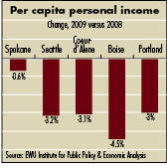
Home » Per capita income fell during 2009
Per capita income fell during 2009
Measurement of personal income per person off here for first time since 1969

September 9, 2010
Per capita personal income fell by 0.6 percent in the Spokane area in 2009, dropping on an annual basis for the first time in 40 years, says the Eastern Washington University-managed Community Indicators program.
A study released recently by the U.S. Bureau of Economic Analysis reported that per capita personal income in the Spokane area fell to $33,810 in 2009, down from $34,011 in 2008, says Patrick Jones, executive director of EWU's Institute for Public Policy and Economic Analysis, which manages the program.
Still, per capita personal income, a per-person measure of income received by households rather than businesses or nonprofit organizations, was off much less sharply in Spokane than nationwide—and was off far less sharply here than in the Seattle, Bellingham, Portland, and Boise areas, Jones says.
The national average decline in the figure was 2.8 percent, but even though the drop-off in Spokane was much smaller, "it is still noteworthy that we are seeing a decline rather than an increase," says the program's Internet-based Measuring Community newsletter.
"There is not one year going back to 1969 in nominal, or current, dollars that per capita income went down," Jones says. Nominal dollars aren't adjusted for inflation.
The drop in 2009 "tells you the challenges that this community has faced, but I think more importantly, what the whole country has faced during the recession," says Jones. In the Coeur d'Alene area, per capita personal income fell 3.1 percent, to $31,265 in 2009, from $32,279 in 2008.
The Measuring Community newsletter says that Spokane fared much better than most other metropolitan areas in Washington state.
"Seattle was hit much harder, falling 3.2 percent from the previous year, as was Bellingham, with a decrease of 2.6 percent. Portland fell 3 percent, and Boise dropped by 4.5 percent."
At times, Seattle and Boise have been held up by critics of economic-development efforts here as examples of metropolitan areas that have grown sharply while Spokane has lagged.
"A lot of people a few years ago were saying, 'Why aren't we like Boise?'" Jones says.
The drop-offs in the other cities "are large declines," he says.
Rich Hadley, president and CEO of Greater Spokane Incorporated, says that the Spokane area performed better than the Seattle, Portland, and Boise areas implies that when the recession hit, those locales had a higher percentage of jobs than Spokane in such good-paying fields as high-tech.
"If they lost some of those jobs, they would have had an accelerated decrease" in per capita personal income because of the bad effects of the recession, he says.
Says Jones, "I think there's some truth to that."
Also, Hadley says, the Spokane area has a strong density of good-paying jobs in such stable areas as the military, government, higher education, and health care.
Jones says, "In general, our relative success in a pretty bad year was due to our diverse economy."
Even though the Spokane area's per capita income fell last year, its total income rose by 0.8 percent. Jones says it just didn't go up enough to offset increasing population, hence the drop in per capita personal income.
Total income is a measurement of total income by geographical area, and the increase in it should make retailers feel somewhat better, he says, adding, "It isn't as if disposable funds available here to be spent went down."
Much of the Spokane area's increase in total income was due to large income gains in health care, of about 10.8 percent, and in government, including local, state, and federal, of 5.7 percent, the Measuring Community newsletter says. Yet, because of a large drop in manufacturing income, of 14 percent, and smaller but significant decreases in retail trade, of 4.6 percent, finance and insurance, of 3.7 percent, and professional, scientific, and technical services, of 2.9 percent, those gains weren't large enough to offset the increase in population, it says.
That population grew here while per capita income went down is a positive sign, Jones says.
"It's good that people felt good enough about this area to move here," he says. "I'd be hard-pressed to think that population went up in some of these other areas. The last time we had a severe recession like this, we stopped growing."
That was in 1982, when population growth in Spokane County fell to 0 percent, and 1983, when it fell to minus 0.2 percent, he says.
The Washington state Office of Financial Management estimates that through March 31 this year, Spokane County's population had grown 1.1 percent in the previous 12 months, Jones says.
Per capita personal income rose in the Tri-Cities and Longview, Wash., on the Columbia River northwest of Vancouver, Wash., the Measuring Community newsletter says.
It says Avista Corp. economist Randy Barcus suggested that efforts to clean up the Hanford Nuclear Reservation helped per capita personal income in the Tri-Cities, while international trade activities helped to boost per capita personal income in the Longview area.
The newsletter says that with the economy in flux, it's difficult to predict what the numbers will look like next year, although given the current data, some cautious optimism might be allowed in Spokane.
It says that among major U.S. metropolitan areas, New York City's per capita personal income fell by 4.1 percent, and Silicon Valley's figure dropped by 3.8 percent.
Jones says the per capita personal income figure takes into account income from job compensation and benefits, government transfer payments such as Social Security, investments and rental properties, and other sources.
"It's the most comprehensive measure there is," he says.
Latest News
Related Articles



